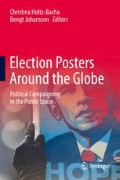Abstract
In a context in which political posters remain as very relevant form of promoting candidates, particularly looking for low-involved political audiences, this chapter seeks to examine the development of ideas expressed in the print advertising of the main political campaigns in Chile in the new democracy (meaning post-Pinochet era). After examining some basic uses of posters in the political world, this article focuses on the specific analysis of the main concepts of them used in the different presidential campaigns. The examination of big ideas of these posters is relevant because they tend to express and summarize the main notions of used by the presidential candidates. Results show that Chilean political campaigns have used (in a direct or indirect manner) a similar perspective over time (a 25 years of time span). It is interesting that the different candidates have used the idea to solve the concrete difficulties or needs (as opposite to “political” ones) of citizens as main appeal to seduce electorate.
Access this chapter
Tax calculation will be finalised at checkout
Purchases are for personal use only
Notes
- 1.
The Chilean Constitution established a 4-year presidential period for the first democratic government and 6 years for subsequent governments. In 2005, this norm was changed again for a 4-year presidential period.
- 2.
If there is no candidate that gets 50% of the votes in the first round, there is a second round with the two most voted candidates (ballotage).
- 3.
Although this system was supposedly created to produce strength in the political system by promoting large, solid, and disciplined coalitions, in practice the binominal system has produced major disputes within the political coalitions and several distortions in the representation of the citizens.
- 4.
Coalition of Christian Democrats, Socialists, Social Democrats, and other center-left-wing forces.
- 5.
Son of Eduardo Frei Montalva, Chilean president from 1964 to 1970.
- 6.
Salvador Allende ruled Chile from 1970 to 1973, and his government finished when Pinochet headed a military coup on 11/09/1973.
- 7.
First women elected president in Latin America.
- 8.
Since during the Lagos government (2005), several changes were carried out by the constitutional order, for example, the presidential period was reestablished in 4 years.
- 9.
Fernando Matthei was the head of the Chilean Air Force and member of the Junta de Gobierno. He was recognized as the most moderate member of this group of generals that governed with Pinochet.
- 10.
Between 1990 and 2010, Chile duplicated its per capita income, which was the highest in Latin America.
- 11.
In Chile, the school evaluation is a scale from 1 to 7, in which 7 represents the highest performance. At the same time, Matthei had number 7 on the ballot.
References
Carey, J. M. (2002). Parties, coalitions, and the Chilean Congress in the 1990s. In S. Morgenstern & B. Nacif (Eds.), Legislative politics in Latin America (pp. 222–253). Cambridge: Cambridge University Press.
Dumitrescu, D. (2009). Spatial visual communications in election campaigns: Political posters strategies in two democracies. Electronic Thesis or Dissertation. https://etd.ohiolink.edu/!etd.send_file?accession=osu1251837832&disposition=inline.
Vico, M. (2013). Palabras del autor. In M. Vico (Ed.), El afiche político en Chile 1970–2013. Unidad popular, clandestinidad, transición democrática y movimientos sociales (pp. 13–14). Santiago de Chile: Ocho Libros Editores.
Author information
Authors and Affiliations
Corresponding author
Editor information
Editors and Affiliations
Rights and permissions
Copyright information
© 2017 Springer International Publishing AG
About this chapter
Cite this chapter
Uribe, R., Walker, P., Chilet, M. (2017). Advertising Concepts in Posters of the Main Chilean Political Campaigns (1989–2013): The Same Ideas with Different Words. In: Holtz-Bacha, C., Johansson, B. (eds) Election Posters Around the Globe. Springer, Cham. https://doi.org/10.1007/978-3-319-32498-2_5
Download citation
DOI: https://doi.org/10.1007/978-3-319-32498-2_5
Published:
Publisher Name: Springer, Cham
Print ISBN: 978-3-319-32496-8
Online ISBN: 978-3-319-32498-2
eBook Packages: Political Science and International StudiesPolitical Science and International Studies (R0)

